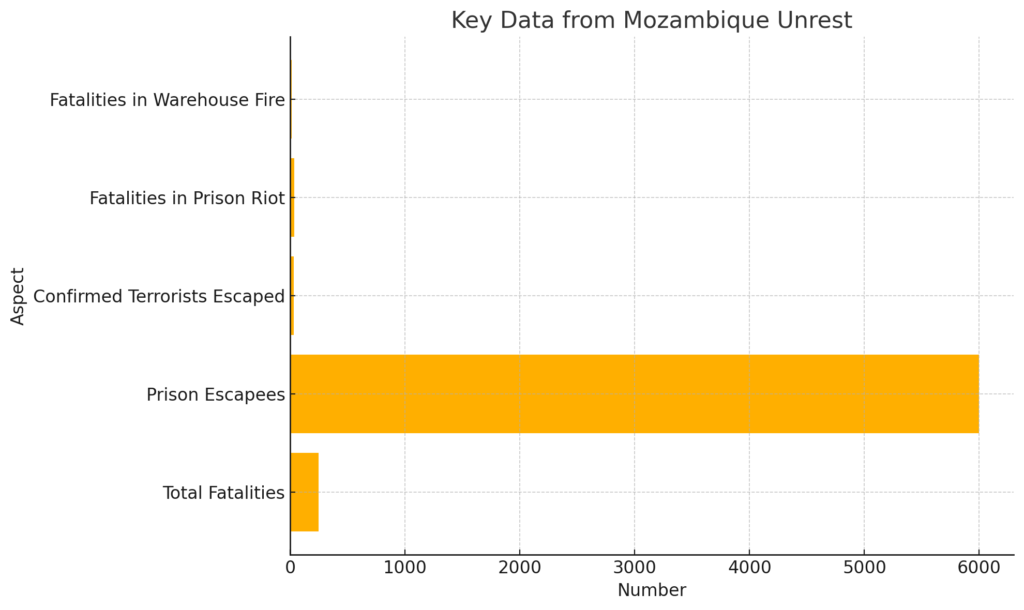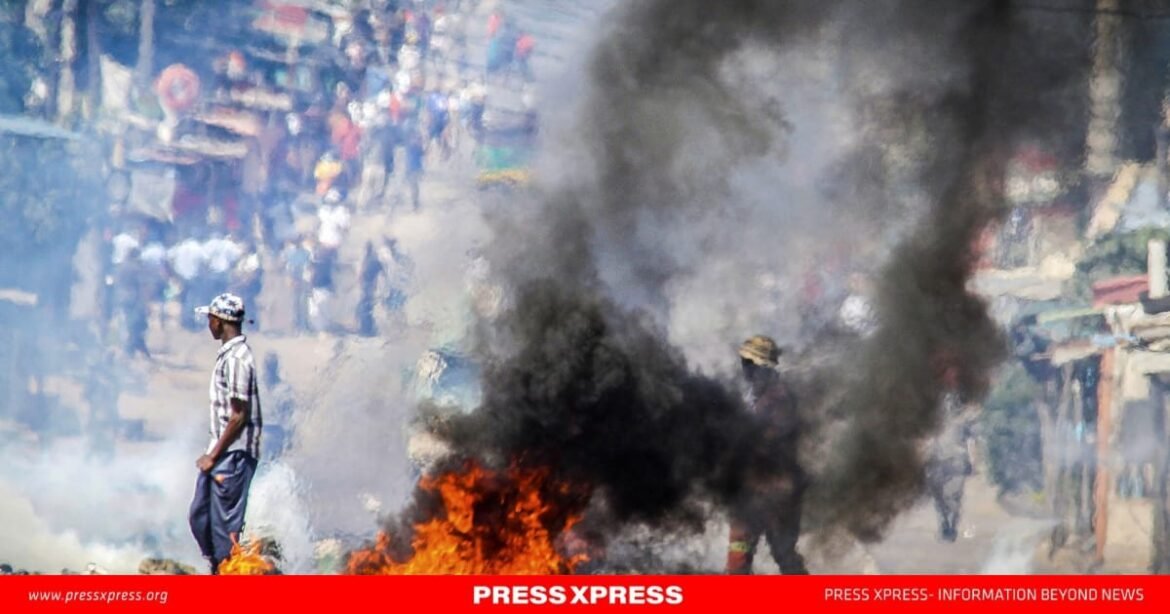Key Events and Developments:
- Post-Election Violence
- Prison Riot and Escape
- Impact on Urban Life
- Role of Law Enforcement and Opposition
Mozambique, a nation with a turbulent history, is currently experiencing one of its most severe crises in recent years. The unrest, sparked by disputed elections and compounded by socioeconomic challenges, has resulted in significant loss of life, widespread destruction, and a massive prison escape. This article examines the underlying causes, key events, and potential resolutions to the unrest, providing a comprehensive analysis of the unfolding crisis.
The Genesis of the Crisis
The crisis in Mozambique can be traced back to the contentious presidential elections held on October 9, 2024. These elections were marred by allegations of vote rigging and a lack of transparency. The ruling Frelimo party, which has been in power since the country gained independence in 1975, declared victory with 65% of the vote, down from an initial 71%. Opposition leader Venancio Mondlane rejected the results outright, accusing the government of manipulating the electoral process. The situation worsened when the Constitutional Council confirmed the results on December 20, 2024, triggering widespread protests and civil unrest in major cities.
Adding to the political turmoil, the escape of 6,000 inmates during a riot at Maputo Central Prison on December 25 highlighted significant vulnerabilities in Mozambique’s security infrastructure. Among the escapees were 29 convicted terrorists, raising alarm about national and regional security. This event, coupled with the political unrest, has exposed the fragile state of Mozambique’s institutions.
Economic inequalities have further exacerbated the situation. High levels of poverty and unemployment have left many citizens feeling disenfranchised and desperate. The economic marginalization of large sections of the population has created a fertile ground for unrest and criminal activities, which have played a significant role in fueling the ongoing crisis.

Figure: 01 Press Xpress
The Escalation of Violence
The protests following the confirmation of the election results quickly turned violent. Demonstrations in major cities such as Maputo and Matola escalated into clashes between protesters and security forces. These confrontations were marked by looting, arson, and widespread disruption of daily life. Businesses were forced to shut down, transportation systems were halted, and normal economic activities came to a standstill.
The humanitarian impact has been devastating. Over 248 people have lost their lives in the violence, including 33 inmates during the prison riot. Looting has devastated local businesses, while fires have claimed additional lives, such as the 11 people who perished in a warehouse fire in the George Dimitrov neighborhood. The destruction of infrastructure and livelihoods has deepened the despair of ordinary citizens.
Law enforcement’s role in the crisis has come under scrutiny. Police Chief Bernardino Rafael has blamed the unrest on “criminals,” while opposition leader Mondlane has accused the police of inciting violence and participating in looting. This mutual blame has further eroded public trust in the authorities and has deepened the divisions within Mozambican society.
Analyzing the Underlying Causes
The unrest in Mozambique is rooted in political disenfranchisement, economic hardship, and institutional fragility. Decades of Frelimo’s dominance have eroded faith in the democratic process. Citizens increasingly view the government as unresponsive to their needs, and the allegations of electoral fraud have only intensified these grievances.
Economic hardship has also played a pivotal role. With persistent poverty and high unemployment rates, many Mozambicans feel left behind by the country’s development. This economic discontent has manifested in widespread looting and vandalism, which underscore the desperation of the populace.
Institutional fragility is another critical factor. The prison break not only highlights weaknesses in law enforcement but also reflects broader governance challenges. Such lapses undermine public confidence in the state’s ability to maintain order and protect its citizens.
Consequences of the Unrest
The consequences of the ongoing crisis are far-reaching. On a social level, the loss of life and displacement of citizens have caused immense suffering. The destruction of businesses and infrastructure has further destabilized communities, leaving many without access to essential services.
From a security perspective, the escape of convicted terrorists poses a significant threat to both Mozambique and the broader region. This development raises concerns about the potential for increased violence and instability in the future.
Economically, the unrest has dealt a severe blow to Mozambique’s recovery prospects. The disruption of businesses and loss of investor confidence are likely to hinder growth and development. The long-term economic repercussions could further entrench poverty and inequality.
Pathways to Resolution
Resolving Mozambique’s crisis requires a multifaceted approach. Political dialogue is essential to addressing electoral grievances and restoring public trust. Meaningful engagement between the government and opposition, facilitated by third-party mediators such as the African Union or the United Nations, could help defuse tensions and pave the way for a more inclusive political process.
Strengthening institutions is also critical. Reforms in law enforcement and judicial systems are necessary to prevent future lapses, such as the recent prison break. Transparent investigations into allegations of police misconduct can help rebuild trust and accountability.
Economic relief measures are urgently needed to alleviate the hardships faced by ordinary Mozambicans. Immediate interventions to address poverty and unemployment should be complemented by long-term investments in education and infrastructure to create sustainable opportunities for economic growth.
Conclusion
Mozambique’s unrest is a stark reminder of the interplay between political, economic, and institutional factors in driving instability. Addressing these challenges requires a comprehensive strategy that prioritizes dialogue, institutional reforms, and socioeconomic development. The support of the international community will be crucial in helping Mozambique navigate this period of turmoil and lay the foundation for a more stable and equitable future.


